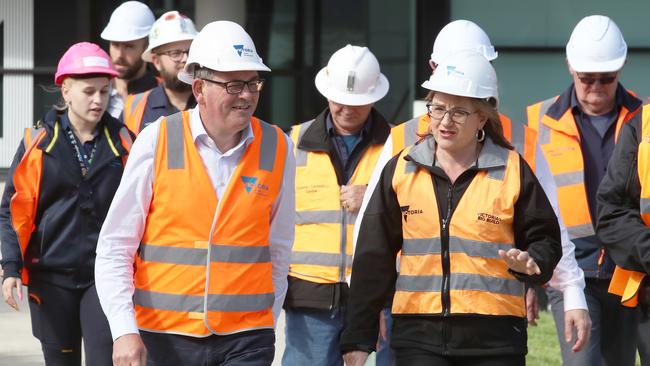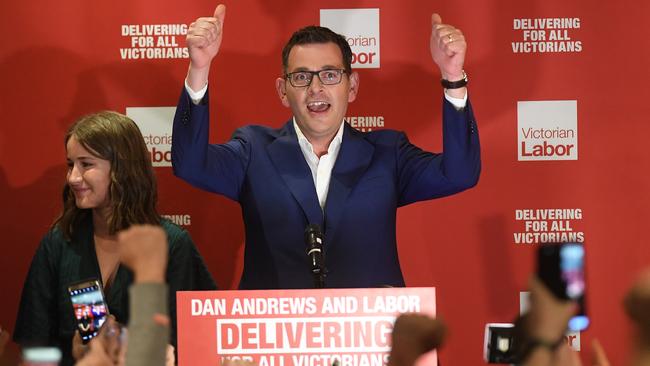Will anything change after alarming IBAC findings?
The Premier’s sketchy memory is not what Victorians should be most worried about – it’s that the anti-corruption system supposed to hold the government to account is broken.
Opinion
Don't miss out on the headlines from Opinion. Followed categories will be added to My News.
The integrity of Daniel Andrews and his government is yet again under a cloud.
And the state’s anti-corruption system is broken.
Much should follow the damning report from Victoria’s anti-corruption watchdog which has found “evidence of misconduct and improper influence” at the highest levels of the Andrews government.
But if history is our guide, nothing will.
The Independent Broad-based Anti-corruption Commission investigated a $1.2m grant provided to the Labor-affiliated Health Workers union in October 2018.
The funding was signed off on the eve of the 2018 election campaign, and just a week after a training program grant was first announced.
It formed part of a multimillion-dollar package for the training of hospital staff against occupational violence that was announced a week before the government went into caretaker mode.
Relations between the Andrews Government and the HWU had been rocky during the government’s first term, so it was in the interest of the government to avoid a public feud with the union during the election campaign.

Department of Health staff were unhappy with the program that was proposed by the union, but ministerial advisers pressured them to play ball.
The IBAC probe focused on the interactions between HWU boss Diana Asmar, Premier Daniel Andrews and his office and members of former minister Jill Hennessy’s staff.
It found public servants were improperly influenced or encouraged to award the funding.
As we’ve come to expect from the Premier, he was unable to recall key facts when giving evidence before the commission.
The point was not lost on IBAC, which raised serious questions about his memory and stopped just short of calling him a liar.
“The Premier had no recollection of what he discussed with Ms Asmar, no recollection of any discussion with his advisers that led to this announcement and no awareness that they and the Minister for Health’s adviser had discussed a detailed proposal including costings ten days before the announcement,” IBAC found.
“It is highly likely that the Premier was informed of the commitment proposal as formulated by his advisers and conveyed the substance of the intended commitment to Ms Asmar when he met her before making the announcement.
“During his examination, the Premier ultimately accepted that he may have done so.”
But the Premier’s challenged memory is not the most critical issue here.
It is the evidence of misconduct and improper influence that has subverted proper process in this state.
IBAC was told, and accepted, that the Premier’s Private Office and vast number of ministerial advisers had tentacles sprawled throughout the public service.
It has essentially politicised the independent bureaucracy which itself is the subject of another probe by the Victorian Ombudsman.

“You will find across governments that ministers’ offices direct departments on the implementation of policies and election commitments … in many ways,” former health minister Jenny Mikakos told IBAC.
“The current Victorian Government is a very centralised government where the PPO has its tentacles everywhere. … There is constant tension between ministers’ offices and the (PPO).”
Basically, what the PPO says, goes, even if that means public servants signing off on deals they would otherwise reject.
It has raised questions “about influence and transparency at the heart of government,” the report found.
Mr Andrews is quick to point out no formal findings of corruption have been made against any individual.
But read between the lines: IBAC wanted to.
But it was hamstrung by legislation that stipulates the definition of corrupt conduct as involving “a breach of public trust, such as the misuse of a public power or position, and can include misuse of information gained by a public officer.”
That misuse can be for private gain, or advantage of that person or another person.
But it must constitute a relevant criminal offence and the probe failed to find evidence of any offence being committed.
Just because a specific crime hasn’t been committed doesn’t mean corruption doesn’t run rife throughout the government.
And IBAC wants this very point addressed.
Because today’s report is the second it has handed down that has stopped short of finding corrupt conduct involving the government.
But it can do no more than act within the confines of the law.
Former commissioner Robert Redlich long argued that IBAC needed better and stronger powers to weed out what he termed “soft corruption”.
This is now a government mired in corruption.
From the Red Shirts election rorts, to branch stacking, and interference over the parliament’s Integrity and Oversight Committee.
If Mr Andrews was serious about transparency and integrity in government he’d accept the recommendations of Mr Redlich, the very man he appointed to stamp out corruption in this state.
Even if he is just a bloke who used to run an agency.
Originally published as Will anything change after alarming IBAC findings?




